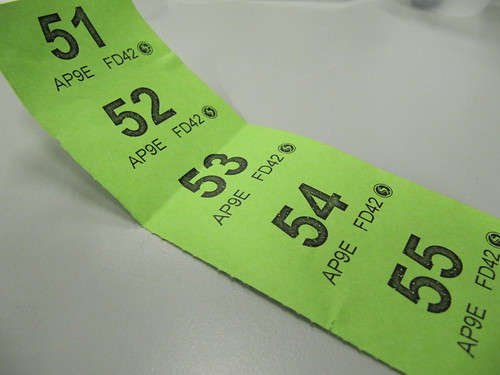The German Word ‘Los’ Posted by Constanze on Dec 14, 2016 in Language
Guten Tag! There are many ‘little’ German words that often interest language learners, and have them asking questions. Why? Because some of these ‘little words’ have different meanings, or can be used either on their own or as part of other words. For this reason they are often confusing at first, which is why, when I come across such a word, I try my best to break it down and make it less scary. This post on the German word NICHT is one such example. Today we’re looking at the curious German word that is LOS.
Los is a word on its own, and you’ll see it as part of other words, too. The way it is used varies a lot.
Los on its own
“Los.”
If anyone ever says “Los” (on its own) to you, they’re saying “Go” or “Let’s go”.
“Komm schon! Los!”
Come on! Let’s go!
They may also say “Los geht’s!” which means “Off we go”, “Let’s go” or “Let’s start”. It basically indicates the start/commencement of something.
What’s wrong?
Also, if you’re in a grump, you may get asked “Was ist los?” which means “What’s wrong/what’s up?”
Similarly, if there is commotion in the street somewhere, you may get asked “Was ist denn hier los?” which means “What’s going on here?”
In this context, the word ‘los’ is used to indicate that something is ‘going on’ or ‘happening’.
Das Los – Los as a noun
You might hear people ask for a Los in a newsagent’s or at a fairground. Das Los (capitalised, as it’s a noun) is a raffle/lottery ticket! Das Los can also mean ‘destiny’, ‘fate’ or ‘luck’ (which ties in with the raffle ticket thing, I guess).
Los at the start of words
Los sometimes attaches itself to the front of verbs. Take the verbs fahren (to go/drive) and lassen (to leave). With los on the front of these verbs, they become:
fahren (to drive/go) – losfahren (to set off/drive off)
lassen (to let/leave) – loslassen (to let go)
These are separable verbs, so they’d look like this in use, with the ‘los’ on its own:
“Ich fahre bald los” – “I’m setting off soon”
“Lass mich los” – “Let me go”
Without the ‘los’ part, these sentences would look like this:
“Ich fahre bald” – “I’m driving/going soon”
„Lass mich“ – „Leave me (alone)“
See the difference? When you add ‘los’, it indicates movement or commencement of something (I hope this makes sense, as it’s quite tricky to explain).
Los at the end of words
Los can also be found on the end of many words. Like this, it is the equivalent of adding the English ‘-less’ onto the end of words. An easy way to remember this is that the word ‘los’ looks like the English word ‘loss’!
Here are some examples:
der Rat – advice, council
ratlos –helpless, clueless
der Sinn – sense, logic, meaning
sinnlos – pointless, senseless, meaningless
die Farbe – colour
farblos – colourless

Ein farbloses Foto – a colourless photo. Photo by danielfuss on flickr.com under a CC license (CC BY-SA 2.0)
All in all, it’s safe to say that Los is a rather versatile little German word! Next time you see the word ‘los’ in a German word (or on its own), see if you can figure out what it means in that context. Any questions, let me know in the comments. 🙂 Do you know any other ways of using the word ‘los’?
Bis bald!
Constanze

Build vocabulary, practice pronunciation, and more with Transparent Language Online. Available anytime, anywhere, on any device.
About the Author: Constanze
Servus! I'm Constanze and I live in the UK. I'm half English and half German, and have been writing about German language and culture on this blog since 2014. I am also a fitness instructor & personal trainer.





Comments:
jon:
Doesn’t it also mean “escape” as in Der Löw ist Los!
Judy:
I remember a scene in some movie when some soldiers were trying to move up a road that was blocked by cows, and I think one of them said “Los mit die Kuhe” or something to that effect – so does it also mean to get out of the way?
Constanze:
@Judy Haha! Yes – that sounds about right! In fact the film ‘Home on the range’ is translated into German with the title ‘Die Kuehe sind los’ – ‘The cows are loose’ or ‘the cows are off’ – something to that effect!
Clint Swift:
I’ve heard this word a lot but never stopped to think about the variants. Good choice for a post. Thanks!
helen:
such a little word changing the meaning. Unbelievable. Thanks for the article
James:
My memoties of the German language are likely inaccurate, as I only studied German for a year in school. That said, does anyone know if “Was ist dein los?” means “What is your problem?” That is how I remember learning it but when looking up the translation, I do not find this to be accurate.
Constanze:
@James Hi James, you’re almost right! The phrase is ‘Was ist denn los?’ Hope that helps 🙂 Constanze
Marina:
What means the austrian word Oida and in how many phrases it can be used
thanks in advance